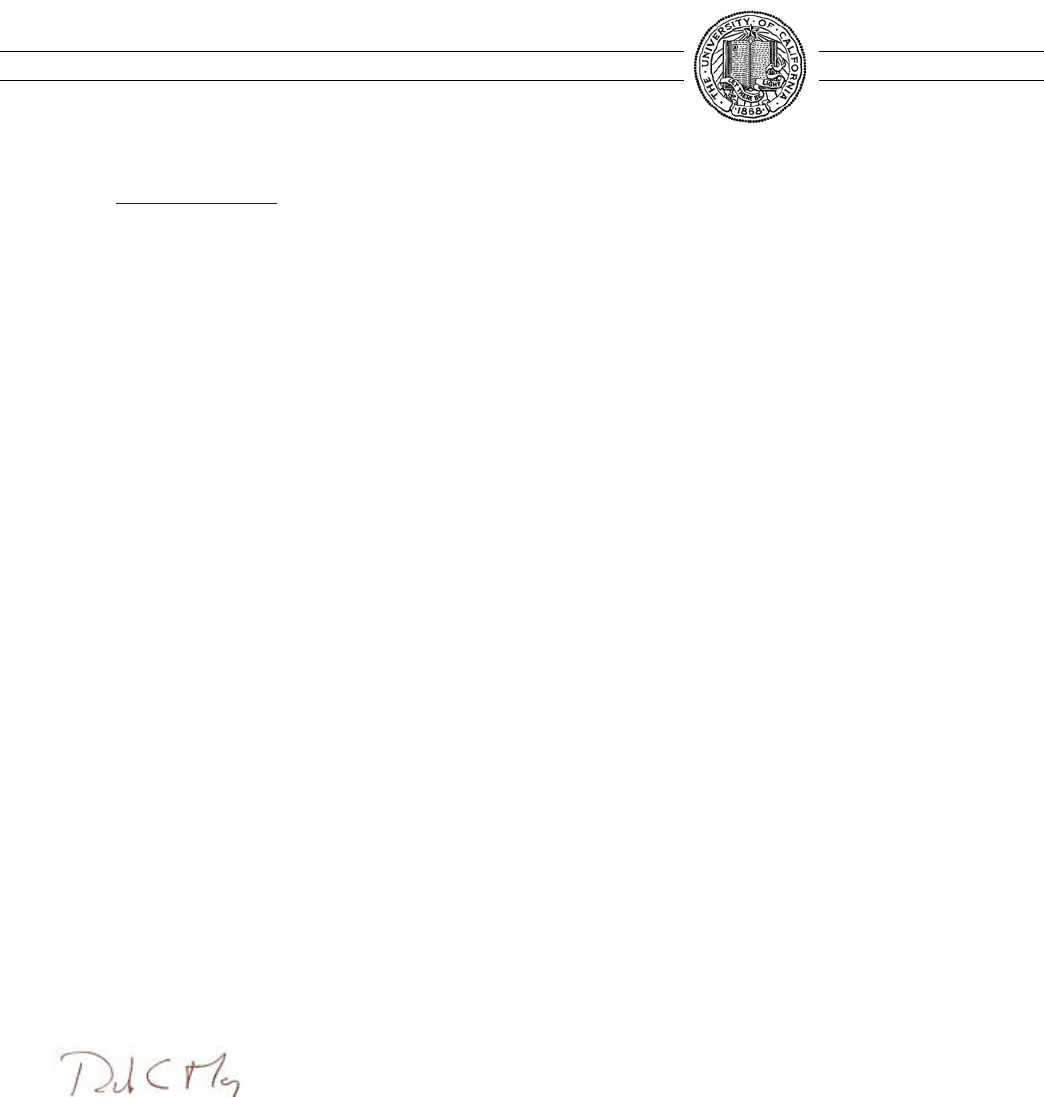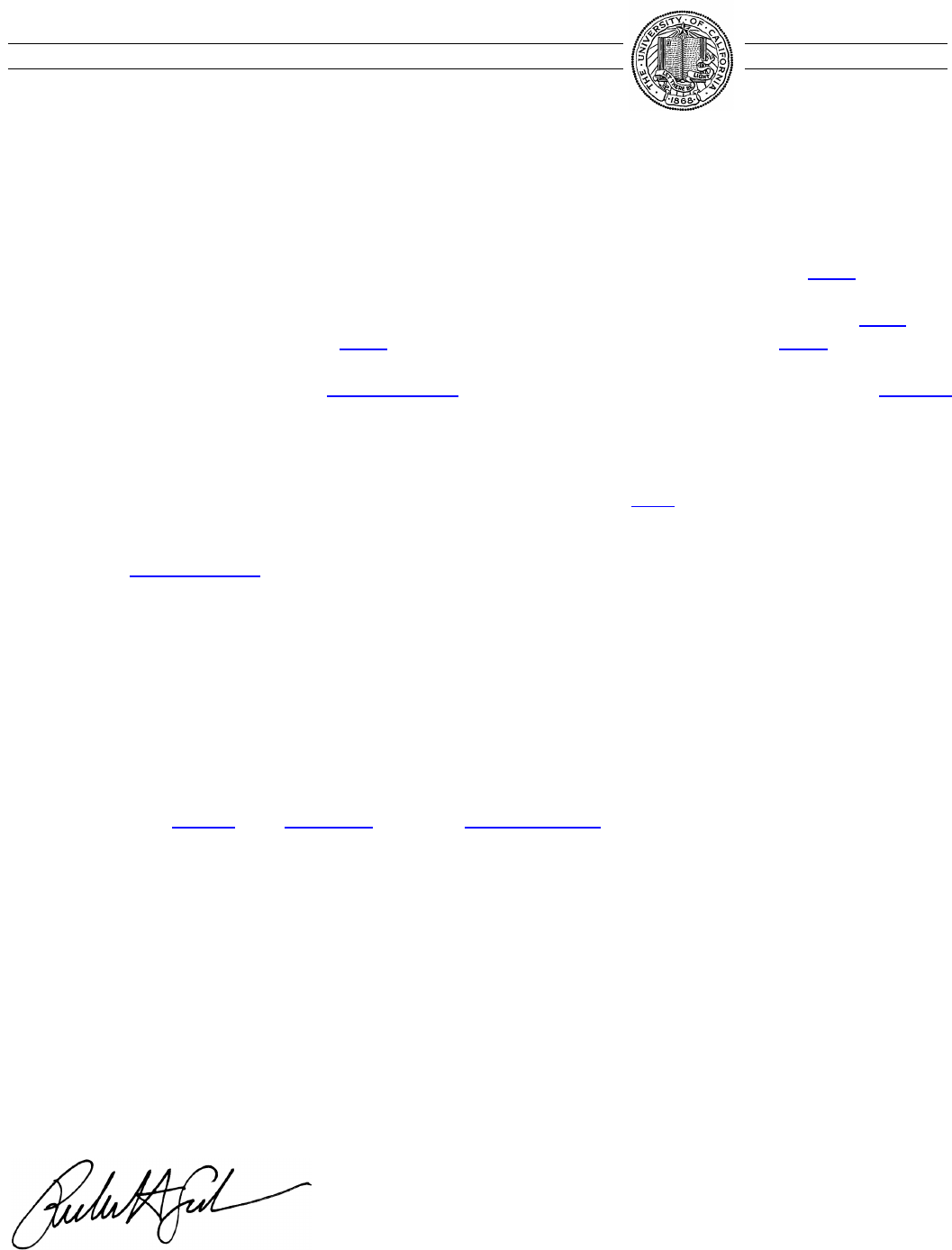
UNIVERSITY OF CALIFORNIA, ACADEMIC SENATE
BERKELEY
• DAVIS • IRVINE • LOS ANGELES • MERCED • RIVERSIDE • SAN DIEGO • SAN FRANCISCO SANTA BARBARA • SANTA CRUZ
Robert C. May Chair of the Assembly of the Academic Senate
Telephone: (510) 987-0711 Faculty Representative to the Regents
Email: robert.may@ucop.edu
University of California
1111 Franklin Street, 12th Floor
Oakland, California 94607-5200
June 3, 2019
JANET NAPOLITANO, PRESIDENT
UNIVERSITY OF CALIFORNIA
RE: Declaration of Rights and Principles to Transform Scholarly Communication
Dear Janet,
At its May 22, 2019 meeting, the Academic Council endorsed unanimously (with one
abstention) the University Committee on Library and Scholarly Communication (UCOLASC)’s
Declaration of Rights and Principles to Transform Scholarly Communication. The Principles
are an aspirational document outlining an ideal future state of scholarly publishing that gives
faculty control over publications and enables the broad dissemination of scholarship. The
Declaration clarifies the faculty’s concerns about the current financially unsustainable
subscription model, which extracts money from the University and provides large profit
margins for commercial publishers earned off of the unpaid labor of faculty authors.
UCOLASC believes that the 18 Principles outlined in the Declaration can help transform the
system of scholarly communication to be more open, fair, transparent, and sustainable. The
Principles have already stimulated debate, inspired other institutions around the world,
increased UC’s visibility and global leadership in the open access movement, and helped guide
the UC Publisher Negotiating Team in its pursuit of the multi-payer “Publish and Read” model
with commercial publishers.
Please do not hesitate to contact me if you have additional questions.
Sincerely,
Robert C. May, Chair
Academic Council
cc: UCOLASC Chair Schneider
Academic Council
Senate Directors

U N I V E R S I T Y O F C A L I F O R N I A
BERKELEY • DAVIS • IRVINE • LOS ANGELES • MERCED • RIVERSIDE • SAN DIEGO • SAN FRANCISCO SANTA BARBARA • SANTA CRUZ
UNIVERSITY COMMITTEE ON LIBRARY AND SCHOLARLY COMMUNICATION Assembly of the Academic Senate
Richard A. Schneider, Chair 1111 Franklin Street, 12
th
Floor
[email protected]du Oakland, CA 94607-5200
13 May 2019
ROBERT MAY, CHAIR
ACADEMIC COUNCIL
Re: Declaration of Rights and Principles to Transform Scholarly Communication
Dear Robert,
On behalf of the University Committee on Library and Scholarly Communication (UCOLASC), I
am writing to inform you that last year UCOLASC strongly and unanimously endorsed (12-0) a
set of 18 principles that we propose be taken into account when the University of California
engages in journal license negotiations with commercial publishers. These principles were
developed by UCOLASC with input from various stakeholders across the University and at other
like-minded academic institutions. Since then, the UCOLASC Principles have been unanimously
endorsed by seven Senate committees (UCAP, UCAF, UCOPR, UCFW, UCACC, CCGA, and
UCPB). These Principles have also motivated other institutions around the world to take action,
and they have helped maintain UC’s visibility and global leadership in the open access movement.
As described in the enclosed cover letter, UCOLASC firmly believes that if adopted, these
principles have great potential to transform the system of scholarly communication from one that
remains closed and unaffordable, to one that is more open, fair, transparent, and sustainable. We
believe that these principles support the mission of UC to serve the public good by “providing
long-term societal benefits through transmitting advanced knowledge, discovering new
knowledge, and functioning as an active working repository of organized knowledge.”
Action item: UCOLASC respectfully requests that Academic Council consider endorsing these
18 principles on behalf of all Academic Senate faculty. Such an endorsement would 1) signal our
collective commitment to advance the public mission of UC; 2) accelerate our ongoing effort to
make the products of UC scholarship as freely and widely available as possible through open
access; and 3) leverage faculty backing to ensure that UC spends taxpayer money in the most
ethically, morally, and socially-responsible way when entering into agreements with publishers.
If you have any questions or require additional information, please feel free to contact me.
Sincerely,
Richard A. Schneider, Chair
UCOLASC

13 April 2018
BERKELEY • DAVIS • IRVINE • LOS ANGELES • MERCED • RIVERSIDE • SAN DIEGO • SAN FRANCISCO SANTA BARBARA • SANTA CRUZ
UNIVERSITY COMMITTEE ON LIBRARY AND SCHOLARLY COMMUNICATION
Assembly of the Academic Senate, University of California
U N I V E R S I T Y O F C A L I F O R N I A
Dear Colleagues,
For well over a decade the University of California has been deeply engaged in leading the effort to
transform scholarly communication from a closed subscription-based publishing system to one
where our work can be freely accessible to all. In 2005, UC Santa Cruz faculty passed a resolution
supporting open access (OA), which prompted a proposed UC systemwide policy in 2007. Although
these initial efforts did not garner enough backing, they laid the groundwork for other institutions to
follow suit and formed the basis of subsequent OA policies at UC San Francisco in 2012, the
systemwide Academic Senate in 2013, and the UC Office of the President in 2015. Because of
these policies, UC authors can now make the 50,000 articles they publish every year immediately
accessible in our UC institutional OA repository. Doing so is one step toward advancing our mission
of disseminating our scholarship as widely as possible and making our many research outputs freely
available to everyone, especially to the taxpayers who underwrite our academic enterprise.
Despite our longstanding commitment to OA, the publishing system has yet to transform into one
that is truly open and economically sustainable. In fact, less than 15% of peer-reviewed articles are
published in journals that are fully OA, the vast majority of work resides behind a subscription
paywall, and commercial publishers continue to extract billions of dollars annually out of the current
system with profit margins among the greatest of any industry. Meanwhile, our library budgets keep
shrinking and we cannot afford the exorbitant price increases that publishers relentlessly levy. UC
spends over $34 million per year for shared access to scholarly journals. Our actual payment is at
least $17 million higher if we include separate campus licenses, personal subscriptions, article
processing charges (APCs), page charges, and pay-per-view downloads. Yet even if we had
unlimited budgets and could bear all of the expenses imposed by profiteering publishers, there
would still remain compelling reasons to transform the current system of scholarly communication.
Historically our main focus when licensing journals and other resources has been to contain rising
costs, expand our portfolio of online materials, and fight restrictive terms. But now we find ourselves
trapped in paying to sustain a broken system that we have been outspokenly trying to change. With
this in mind, our faculty, our librarians, and our administrators have begun to speak with one voice
and insist that we as an institution put our money where our mouth is. We want UC expenditures to
be congruent with our broader and longer-term OA objectives, and be aimed at upending the status
quo. Since our salaries and our subscription budgets come directly from state funds, we feel we
have a duty to set clear terms and conditions that ensure such taxpayer money gets spent in the
most ethically, morally, and socially-responsible way, and expressly for the greater good.
To this end, we as faculty representatives of our University, assert the rights of authors and affiliated
stakeholders—who labor to produce works of knowledge and art of value to society—to own,
control, and freely disseminate for the benefit of the public, the products of their efforts, including
publications, data, metadata, and related research outputs. Backed by faculty resolve, we propose
the following 18 principles to make scholarly communication more open, fair, transparent, and
sustainable when applied as levers by UC during license negotiations with journal publishers.
Sincerely,
Richard A. Schneider
Chair, UCOLASC

13 April 2018
BERKELEY • DAVIS • IRVINE • LOS ANGELES • MERCED • RIVERSIDE • SAN DIEGO • SAN FRANCISCO SANTA BARBARA • SANTA CRUZ
UNIVERSITY COMMITTEE ON LIBRARY AND SCHOLARLY COMMUNICATION
Assembly of the Academic Senate, University of California
U N I V E R S I T Y O F C A L I F O R N I A
DECLARATION OF RIGHTS AND PRINCIPLES TO TRANSFORM SCHOLARLY COMMUNICATION
To align our institutional policies and practices toward the goal of replacing subscription-based
publishing with open access (OA), we propose that the University of California assert the
following rights and principles when negotiating with publishers during journal license renewals:
1. No copyright transfers. Our authors shall be allowed to retain copyright in their work and
grant a Creative Commons Attribution license of their choosing.
2. No restrictions on preprints. Our authors shall have the right to submit for publication work
they have previously made available as preprints.
3. No waivers of OA Policy. Publishers shall not require our authors to provide waivers of our
Institutional OA Policy as a condition for publishing our work.
4. No delays to sharing. Publishers shall make work by our authors immediately available for
harvest or via automatic deposit into our Institutional OA repository or another public archive.
5. No limitations on author reuse. Our authors shall have the right to reuse figures, tables,
data, and text from their published work without permission or payment.
6. No impediments to rights reversion. Publishers shall provide a simple process for our
authors to regain copyright in their previously published work.
7. No curtailment of copyright exceptions. Licenses shall not restrict, and should instead
expressly protect, the rights of authors, institutions, and the public to reuse excerpts of
published work consistent with legal exceptions and limitations on copyright such as fair use.
8. No barriers to data availability. Our authors shall have the right to make all of their data,
figures, and other supporting materials from their published work publicly available.
9. No constraints on content mining. Publishers shall make licensed materials open,
accessible, and machine-readable for text and data mining by our researchers, at no
additional cost and under terms that allow retention and reuse of results.
10. No closed metadata. Publishers shall make bibliographic records, usage metrics, and
citation data for our authors freely available, easy to parse, and machine-readable.
11. No free labor. Publishers shall provide our Institution with data on peer review and editorial
contributions by our authors in support of journals, and such contributions shall be taken into
account when determining the cost of our subscriptions or OA fees for our authors.
12. No long-term subscriptions. Publishers shall provide our Institution with plans and timelines
for transitioning their subscription journals to OA.
13. No permanent paywalls. Our Institution shall receive perpetual access for previously
licensed content and back files shall be made freely available once a journal transitions to OA.
14. No double payments. Publishers shall provide our Institution with data on hybrid OA
payments from our authors and such payments shall reduce the cost of our subscriptions.
15. No hidden profits. Publishers shall use transparent pricing for the services they provide our
authors when levying article processing charges and other fees associated with publishing.
16. No deals without OA offsets. Our Institution shall only enter into publishing agreements that
include offsets for OA publishing by our authors.
17. No new paywalls for our work. Work by our authors shall be made OA on the publisher’s
website as part of subscription terms for new journals.
18. No non-disclosure agreements. Publisher agreements with our Institution shall be
transparent and shall not contain terms that prevent the sharing of their contents.

U N I V E R S I T Y O F C A L I F O R N I A
BERKELEY • DAVIS • IRVINE • LOS ANGELES • MERCED • RIVERSIDE • SAN DIEGO • SAN FRANCISCO SANTA BARBARA • SANTA CRUZ
UNIVERSITY COMMITTEE ON LIBRARY AND SCHOLARLY COMMUNICATION Assembly of the Academic Senate
Richard A. Schneider, Chair 1111 Franklin Street, 12
th
Floor
rich.schneider@ucsf.edu Oakland, CA 94607-5200
25 April 2018
Re: Declaration of Rights and Principles to Transform Scholarly Communication
Dear Colleagues,
On behalf of the University Committee on Library and Scholarly Communication (UCOLASC),
we are writing to report that UCOLASC has strongly and unanimously endorsed (12-0) a set of
18 principles that we propose be taken into account when the University of California engages in
its upcoming and future journal license negotiations with commercial publishers. These
principles were developed by UCOLASC during the course of the year with input from various
stakeholders across the University and at other like-minded academic institutions.
As described in the enclosed cover letter, UCOLASC firmly believes that if adopted, these
principles have great potential to transform the system of scholarly communication from one that
remains closed and unaffordable, to one that is more open, fair, transparent, and sustainable.
We believe that these principles support the mission of UC to serve the public good by
“providing long-term societal benefits through transmitting advanced knowledge, discovering
new knowledge, and functioning as an active working repository of organized knowledge.”
UCOLASC devised and endorsed these 18 principles 1) to signal our collective commitment to
advance the public mission of UC; 2) to accelerate our ongoing effort to make the products of
UC research and scholarship as freely and widely available as possible through open access;
and 3) to leverage faculty backing to ensure that UC spends taxpayer money in the most
ethically, morally, and socially-responsible way when entering into agreements with publishers.
In closing, while publishers continue to go to great lengths to restrict the rights and academic
freedom of authors, we believe that this proposal can help restore the balance of power and
give faculty more control over the fruits of their labor. Based on these principles, our expectation
is that UC will push for terms and conditions in publisher agreements that are transformative
and closely aligned with our short- and long-term goals for scholarly communication.
Sincerely,
Richard A. Schneider, Chair
Dennis Ventry, Vice Chair
Geoffrey Koziol, UC Berkeley
Kathryn Olmsted, UC Davis
Amelia Regan, UC Irvine
Eric Sobel, UC Los Angeles
Karl Ryavec, UC Merced
Jiayu Liao, UC Riverside
Eric Bakovic, UC San Diego
Diana Laird, UC San Francisco
John Du Bois, UC Santa Barbara
Jennifer Horne, UC Santa Cruz
